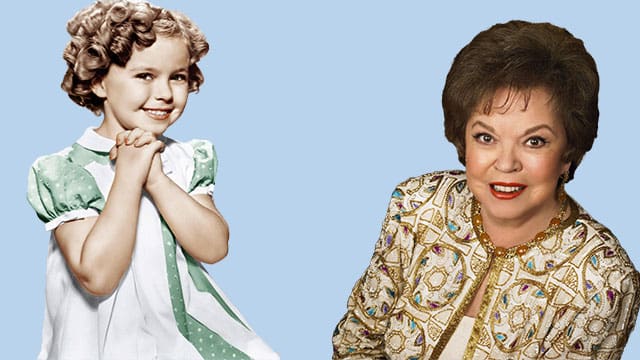Shirley Temple: A journey from Hollywood fame to diplomatic triumph
 Born in Santa Monica, California, on April 23, 1928, Shirley Temple made her screen debut at age three, en route to becoming America’s most popular movie star by the time she was seven. It was a box-office dominance she held for four years (1935 to 1938). Even the legendary Clark Gable had to be content with second place.
Born in Santa Monica, California, on April 23, 1928, Shirley Temple made her screen debut at age three, en route to becoming America’s most popular movie star by the time she was seven. It was a box-office dominance she held for four years (1935 to 1938). Even the legendary Clark Gable had to be content with second place.
Her 2014 New York Times obituary described the young Shirley as “a dimpled, precocious and determined little girl” who “sang and tap-danced her way to a height of Hollywood stardom and worldwide fame that no other child has reached.” With her trademark 56 golden ringlets and sunny smile, she invariably played a “wise and maternal miniature adult, dominating the adults around her and solving their problems with unbounded optimism and common sense.”
But, like most child stars, her massive popularity didn’t extend into her adult years. By 1945, the adorable moppet of the 1930s had grown into “a strong-willed, chain-smoking 17-year-old.”
 Shirley Temple’s life wasn’t one of those familiar Hollywood tales of personal decline, addiction, emotional damage or regret. |
| Related Stories |
| The rise and fall of a legendary Hollywood duo
|
| Swashbucklers on the silver screen
|
| Olivia de Havilland was more than an actress
|
Hers, however, isn’t one of those familiar Hollywood tales of personal decline, addiction, emotional damage or regret. Shirley was way too level-headed for that. Psyche unharmed, she quit the movie business in 1950, became Shirley Temple Black, embarked on a marriage that lasted until her husband’s death 55 years later, and set about pursuing other interests.
When Soviet tanks rolled into Prague in August 1968 to put an end to Alexander Dubcek’s experiment in “socialism with a human face,” Shirley happened to be there in her capacity as co-founder of the International Federation of Multiple Sclerosis Societies. The experience left an indelible mark.
It wasn’t a matter of having been a hitherto political naif. She had already been involved in conservative California Republican politics, first in a fundraising capacity and then as an unsuccessful congressional candidate. But the brutality she witnessed in Prague sharpened her interest, particularly in the realm of foreign affairs.
Reputedly, Shirley’s knowledge of contemporary African issues caught Henry Kissinger’s attention at a social event. Whether that’s true or merely a good story, she did do a stint as a U.S. delegate to the United Nations during the Nixon administration, subsequently joining the American team at the 1972 Stockholm environmental conference. And when Gerald Ford replaced Nixon in 1974, she was tapped to serve as U.S. ambassador to Ghana.
Unsurprisingly, the appointment caused consternation in some circles. But Shirley wasn’t intimidated. Writing years later, she put it this way: “Macho attitudes usually fall victim to hard work, timely humour, and an absence of resentment.” In other words, she got the job done.
Then Ford’s 1976 election loss turned the government over to Jimmy Carter’s Democrats and Shirley’s diplomatic career was duly put on ice, where it remained during Ronald Reagan’s subsequent eight-year presidency.
This doesn’t appear to have been a matter of any personal animosity – Reagan privately wrote nice things about her. But they’d been on opposite sides of the intense battle for control of the Republican Party, Shirley siding with the establishment Ford/Bush wing rather than the ascending Reagan insurgency.
Then, when George H. W. Bush succeeded Reagan in 1989, Shirley Temple Black got the job she really wanted. She was going back to Prague, this time as U.S. ambassador to Czechoslovakia.
Although Eastern Europe was very much in flux following the Soviet implosion, Czechoslovakia was still ruled by the hardliners who’d supported the 1968 invasion. And stepping aside wasn’t what they had in mind.
It would be necessary to walk a careful line as ambassador, but there was never any doubt as to where Shirley stood.
Speaking to the Prague press, she noted that “the age-old and very useful and important message is that you don’t intervene in the internal affairs of another state. But one can certainly urge a government to meet its treaty obligations, particularly in the area of human rights.” Privately, she made it clear that the coveted Most Favoured Nation trading status would be contingent on progress in that regard.
She also co-ordinated with dissidents, attended demonstrations – surreptitiously at first and then more openly – and publicly condemned instances of violent repression. And when the dictatorial government lost its nerve and capitulated to the peaceful Velvet Revolution, she was justifiably jubilant.
Henry Kissinger – who could be a caustic commentator on what he perceived as other people’s inadequacies – had good things to say about the diplomatic performance of Shirley Temple Black. She was, in his view, “very intelligent, very tough-minded, very disciplined.”
All in all, not too shabby a second act for the precociously determined little girl who once enthralled millions with On the Good Ship Lollipop.
Troy Media columnist Pat Murphy casts a history buff’s eye at the goings-on in our world. Never cynical – well, perhaps a little bit.
For interview requests, click here.
The opinions expressed by our columnists and contributors are theirs alone and do not inherently or expressly reflect the views of our publication.
© Troy Media
Troy Media is an editorial content provider to media outlets and its own hosted community news outlets across Canada.

